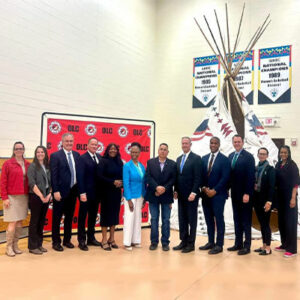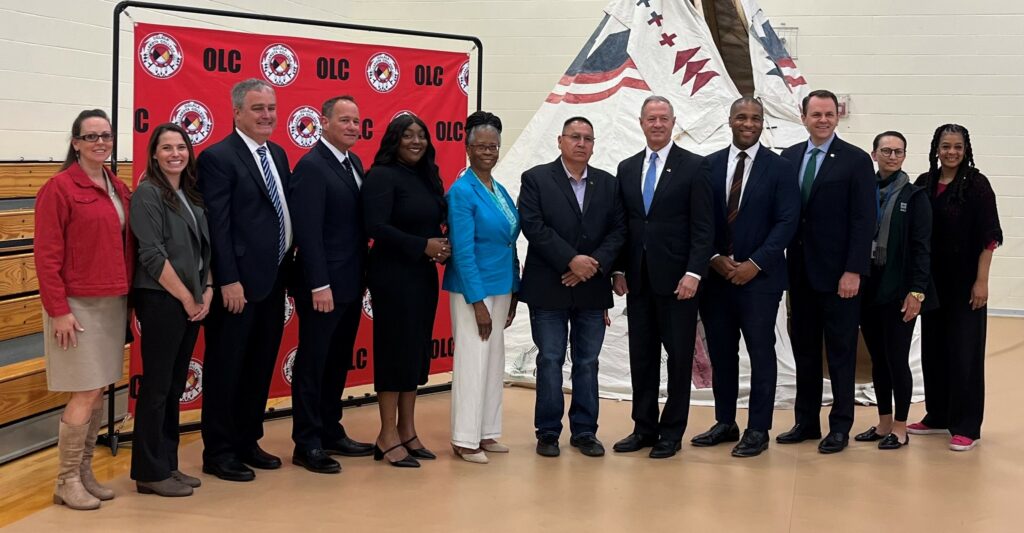Service Delivery on Pine Ridge – Meeting the Oglala Lakota People Where They Are
Reading Time: 3 MinutesLast Updated: August 26, 2024

During my year as a White House Fellow at Social Security, I have worked to address the negative impact of income and health inequities on the Oglala Lakota people of the Pine Ridge Reservation in South Dakota.
More than 50% of the Oglala Lakota population lives below the federal poverty line. Average life expectancy on the reservation is about 48 years for men, 52 for women. (Average life expectancy in the U.S. is 73 for men, 79 for women, according to Social Security’s most recent data.)
I visited Pine Ridge for the first time in September 2023 with Social Security executives, including Acting Commissioner Kilolo Kijakazi and Richard Litsey and Renee Ferguson from the Office of Native American Partnerships. We wanted to learn firsthand about the community and the barriers Native people face in receiving Social Security disability benefits. We participated in a Tribal Consultation and heard directly from Tribal Council members about their concerns.
We promised to return to Pine Ridge.
Over the next few months, I developed an initiative to address many of the disparities and challenges we learned about. Our team in the Office of Native American Partnerships planned a Benefits and Health Fair to educate the people of Pine Ridge about Social Security and other resources. Every organization and government agency we contacted was supportive of the event. We quickly realized there was real desire for collaboration.
The day-long Benefits and Health Fair at Pine Ridge was held on May 22, 2024. We were joined by Commissioner Martin O’Malley, who is committed to ensuring equitable access to Social Security programs and benefits.
A few highlights of the event are listed below:
- A panel discussion with various government agencies to share information and highlight resources available to people on the reservation:
- Representatives from the Substance Abuse and Mental Health Services Administration (SAMHSA) addressed the suicide and mental health crisis in Native communities.
- Representatives from the Veterans Health Administration—including their White House Fellow—spoke about a new co-pay exemption waiver program for veterans.
- A White House Fellow from the Domestic Policy Council spoke about the opioid crisis and the effort to distribute Naloxone to people in marginalized communities. Naloxone is an opioid overdose reversal medication.
In addition to the panel:
- Representatives from the Indian Health Services (IHS) provided Naloxone training to Tribal members and offered free health screenings.
- The American Heart Association donated CPR and defibrillator kits, and I led participants through training workshops.
- Social Security staff took benefit applications on site, eliminating the need for people to visit the nearest office two hours away. Employees served more Tribal members that day than local offices had in the previous 3 months.
The Benefits and Health Fair is an incredible example of what can happen when multiple partners work together with a local community towards a common cause.
I looked around that day at a room full of our federal and local partners, many who lived and worked on the reservation. I felt a real sense of pride at what we had accomplished by working together.
Building trust and breaking down barriers takes time. It begins with showing up and keeping promises.
The Pine Ridge fair is only the beginning of our partnership with the Oglala Lakota people. We hope to replicate this model of service delivery on other reservations and in underserved communities.
Visit our American Indians and Alaska Natives page to learn more about our Tribal services and benefits and read our Fiscal Year 2024 Tribal Consultation and Call to Action Plan. You’ll find our Equity Action Plan 2023 Update on our Equity page.

From left: Renee Ferguson, Shayla Hagburg, Jack Leuchtman, Howard Bowles, Mariah Sklyr, Dr. Kilolo Kijakazi, Frank Star Comes Out, Martin O’Malley, Dr. Bryan Smith, Michael Hole, Alicia Mousseau, Andrea Moore
Did you find this Information helpful?
Tags: equity, Federal Agencies, People Facing Barriers
See CommentsAbout the Author
Comments
Leave a Comment
Please review our Comment Policy before leaving a comment. For your safety, please do not post Personally Identifiable Information (such as your Social Security Number, address, phone number, email address, bank account number, or birthdate) on our blog.

Renee M.
I have been donating clothes, books,money for books to the reservationi. I can’t understand how we can help immigrants, refugees poor people but we do not support are Native Americans. The pass laws should be revised. What good is it if we don’t have stores and buses to get the children to school. Of course they turn to drug and alcohol. What is wrong with the people who should be speaking up and doing something. Some of our Actors Help other countries and not thing of our Native Americans.
I wish I could do more